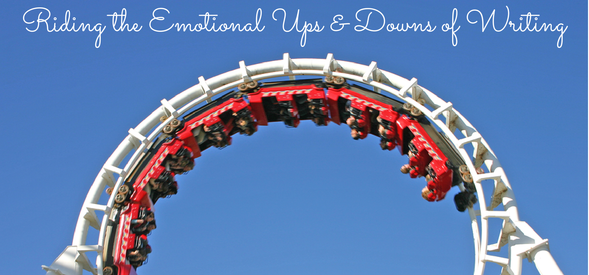 Note from Jenna: This guest post from one of my screenwriting colleagues and best friends, Isabel Holtreman. Isabel is a talented writer and is one of my most trusted feedback sources, both for my writing itself and for emotional support around the challenges of writing. I’m thrilled she was willing to take the time to talk with us today about navigating the emotional ups and downs of writing, and how she does it.
Note from Jenna: This guest post from one of my screenwriting colleagues and best friends, Isabel Holtreman. Isabel is a talented writer and is one of my most trusted feedback sources, both for my writing itself and for emotional support around the challenges of writing. I’m thrilled she was willing to take the time to talk with us today about navigating the emotional ups and downs of writing, and how she does it.
Be sure and leave a comment at the end of the post and let us know what inspired you.
How to Ride the Emotional Roller Coaster of Being a Writer
by Isabel Holtreman
I’m in marketing mode. I’ve never really taken marketing seriously until now, but it’s that time — the time where you realize that you must push yourself out of the realm of amateur and finally go pro.
Over the past few weeks, I’ve noticed some emotions coming up around where I am in my writing career:
- I miss working on story, something I can’t seem to do while I’m marketing. It engages a different part of my brain.
- I feel like an imposter, like at any moment, someone will find out that I’m not a writer at all, but some big fake who’s trying to fool the world.
- I’m elated when someone asks to read my work, but am devastated when a few days go by without a request.
I experience a similar thing when I’m in writing mode:
- I feel like I should be marketing something, because if I don’t, I’ll never make any money as a writer which will negate my newly acquired professional status.
- I feel like an imposter, like at any moment, someone will find out that I’m not a writer at all, but some big fake who’s trying to fool the world.
- I’m elated when story is flowing and everything is clicking, then devastated when I get stuck or can’t find a way to solve a story problem.
Does any of this sound familiar?
I’m sure it does. Being a writer is hard work. And I’m not just talking about the work itself. It’s difficult to stay even, to function in society, to not allow ourselves to fall into the pit of despair, and keep ourselves from paralyzing.
So, how do we deal with this emotional roller coaster without driving ourselves or our loved ones insane?
And perhaps even more importantly, without giving up on the dream?
Well, once again, we have to be willing to hunker down and do the work. Whether you decide to do the work on paper as I do (or on a computer) and journal, or decide to talk to someone, the fact is, the emotions must be acknowledged, brought to the surface, and observed for all they really are: Feelings.
Feelings are not ultimate truths.
They are simply clues, little alarms that lead us to overcoming our fears, and it’s our job to allow the feeling to flow, jump into our logical minds and say “Oh. Wow. There’s that feeling again. Okay, it’s just a feeling,” then take a step, ANY STEP toward overcoming it and moving forward.
Here are a few tips that have worked for me:
- Cry. I know, I know. It seems counter-intuitive, but it’s a quick way to get the feelings out. Set a timer and cry for 5 minutes, then wipe your eyes and write a sentence. It doesn’t matter whether it’s in a journal or novel or script. The act of writing breeds more writing.
- “It’s just a feeling, it’s not truth.” I repeat this phrase to myself a lot. It helps to help put feelings into perspective and understand that an emotion is just an emotion, a temporary, fleeting thing and that it doesn’t have to stop me.
- Give yourself a break. There’s no use trying to power through if your emotions are overpowering you. For those minutes or hours when you’re feeling at your lowest, step away from the work and connect to your heart, your humanity. Playing with a child, going for a walk, kissing a spouse, getting a hug — all these things put our lives into perspective and help us to realize that writing is what we do and not who we are.
- Journal. This has been the single most effective tool I’ve used for dealing with my emotions, period. Allow your feelings to flow on paper or on your computer for as long as you need, then ask yourself this question: “How can I turn this around?” With a little practice, you’ll find a ray of hope that will pull you out of your fear, anger or sorrow.
All of these tools do one very important thing: they teach us how to step back, observe, and process emotions while we’re still feeling them, which almost immediately reduces their power over us.
The roller coaster of emotions will always be part of the writer’s life, but with a little perspective and a few good tools, we can minimize the ups and downs, find a little peace, and get back to work.
![]()
Isabel Holtreman is an optioned screenwriter and consultant with a master’s degree in screenwriting from Cal State.
![]()
Thanks for reading!
We’d love to hear your thoughts in the comments.
Warmly,



Hi Jenna and Isabel,
Great points about life as roller coaster, the push and pull of demands and desires. Marketing in and of itself conjures up bizarre feelings since we associate it with being a fraud. I don’t know why we teach kids to feel that way about it, but we do.
I’ve got to market, write, design, paint, sing, promote creativity and open and transparent government. And this is the most alive I’ve felt. I kinda of delve into one more deeply than the others, then change to another, then another. It keeps all of them fresh. And in between all of them I pause as much as possible because that’s when I get most of my greatest ideas.
Here’s to your greatness as a commercial writer!
G.
Hi Giuletta,
Thanks so much for your comment. Yes, alternating or “going with the energy in the moment” as my husband likes to say, is a very effective tool to keep moving forward when we get stuck a little in any one area. Good for you for having such a great handle on your very varied life!
But the thing you said that struck me the most was that you “pause as much as possible.” That’s a big secret of mine too. Knowing when to pause and just step back for a bit is a great tool for being able to push forward and through in the long run.
Thanks for your good wishes and I send you the same.
Isabel
Jenna and Isabel,
Thanks for sharing this. I feel like this was written just for me. All my self doubt, and negative self talk has gotten in the way of any productive writing I’ve been struggling with for the last month or so. This has given me a some insight in how to tackle them.
Thank you so much!
xo
Hi Christina,
So happy to hear this helped you. We all go through moments (hours, days, sometimes longer) of self-doubt and beating ourselves up in our creative lives. Just this morning I was journaling about how I’m feeling especially vulnerable today about whether I really have what it takes to succeed in such a competitive business, and all I could do in the moment was say to myself “trust is all you have, kiddo, trust that your instincts and skills are there and that you’re just having a moment.”
Trust, Christina. It’s all in there. Give yourself permission to write something, anything and the rest will come. Don’t judge, just write. You can always fix it later.
Thank you so much for commenting.
Isabel
Hi Jenna and Isabel,
Thank you for this post, the reminder that balance for sanity (and productivity) is essential. Just yesterday, I had a meeting where we brainstormed about doing a workbook as part of a course … I got very excited … and when I got home I spent way too much time on the computer writing and researching because “I was on roll” (even though I “know” better). Then I paid for it … my brain went into overdrive and I was awake until 1:30 am, unable to sleep and now is messing with the morning I had planned. As important as it is to process our feelings, and I agree with all that you’re saying here … I believe it is equally important to reflect on and gently challenge our thoughts as a part of a practice … for they often share a very thin line. I’m not sure this makes sense, I’m exhausted this morning. ;)
Hey Lee,
I hope you’ve gotten some well-deserved rest this weekend. I agree with you wholeheartedly and usually feel that thoughts and feelings are pretty much interchangeable. One could argue that what was driving you to work that hard and long wasn’t just a thought but the feeling of needing to accomplish, or the feeling of fear in perhaps losing the momentum from the meeting. I experienced something similar on Friday evening when it was clearly time to stop as I was starting to hit a wall and I wanted to push through it and continue. Luckily I did a bit of that “gentle challenging” you mentioned and decide to quit while I was ahead.
Thanks so much for writing.
Isabel